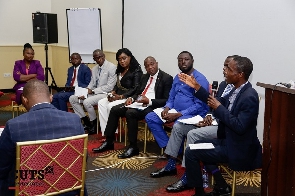 Panel discussion on making SMEs competitive through access to trade finance
Panel discussion on making SMEs competitive through access to trade finance
Stakeholders in the financial sector have convened in Accra at a Public Private Dialogue to discuss practical ways to improve access to trade finance for Small Medium Enterprises (SMEs) in the country.
The Public-Private Dialogue (PPD) which was organized by a leading Research and Public Policy think tank, CUTS International Accra with support from GIZ Ghana sought to engage relevant stakeholders on how to practically improve businesses and SMEs’ access to trade finance, especially now that African Continental Free Trade Agreement (AfCFTA) is operationalized.
In his welcoming remarks, the West African Regional Director of CUTS International, Mr Appiah Kusi Adomako explained that with the commencement of Trading under AfCFTA in January 2021, government and banks in the country must retool their trade finance packages to support SMEs in Ghana to make them competitive and improve their businesses and service.
“Businesses and SMEs, require finance to be able to increase their business and improve their services to fulfill the demands of the growing market and AfCFTA. However, most of these SMEs in Ghana, similar to other African countries, face obstacles when trying to get trade financing, hence the call on government and financial institutions to support SMEs,” Mr Adomako explained.
He added that access to trade finance is listed as one of the biggest problems that SMEs in Ghana must deal with.
Mr Adomako explained that “the AfCFTA presents a rare opportunity for businesses across the continent to be able to export goods, largely quota-free and duty-free. On the parallel side also, member countries can equally import from one country to the other without any quantitative restriction. Even if an SME is not willing to export under the AfCFTA agreement, it must ensure that it is competitive at the local market as it can face competition from other African imports.”
Mr Adomako emphasized that “the establishment of the Development Bank Ghana (DBG) by Government of Ghana, aimed at providing long-term and competitively priced loans to SMEs who have long struggled with the problem of access to finance to ensure that SMEs are better financed in critical sectors of the economy.
While I commend the government for this great initiative, there is the need to create a good and friendly business environment and tailor-make policies and initiatives for the private sector, to guarantee SMEs have access to trade financing to support the growth and expansion of their business to other countries.”
In addition, Mr Adomako explained there is the need to also create a good and friendly business environment and tailored-made policies and initiatives for the private sector, to guarantee SMEs have access to trade financing to support the growth and expansion of their business to other countries”.
An Economist with the Bank of Ghana, Mr Kwasi Acheampong also emphasized that the Bank of Ghana is putting in measures to cushion businesses and support SME development. He said although the country is going through some economic difficulties, the Bank of Ghana is committed and is rolling out strategies and measures to address the current economic state of play.
On his path, the Technical Advisor at the GIZ Trade Hub, Mr James Amisssah Hammond underscored the critical role SMEs play in the success of the AfCFTA and their contribution to Ghana’s GDP and trade.
He explained that GIZ has conducted several training programs on the AfCFTA, and rules of Origin to build the capacity of the SMEs and improve their knowledge and awareness of the Agreement. He emphasized GIZ’s commitment to supporting SME development to unlock their potential to position them to benefit the AfCFTA.
In attendance were representatives from the Bank of Ghana, US Embassy, European Union, Zenith Bank, Ghana National Chamber of Commerce and Industry, Ministry of Foreign Affairs and Regional Integration, Absa Bank, Association of Bankers, Chartered Institute of Bankers,
KPMG, Ghana Revenue Authority, Ghana Enterprise Agency, Ministry of Trade and Industry, Cal Bank, ARB Apex Bank, Prudential Bank, Economics Department of the University of Ghana, Ghana Investment Promotion Centre (GIPC), GT Bank, GBC Bank Plc, FBN Bank among others, Private Enterprise Federation, the media and SMEs in Accra.